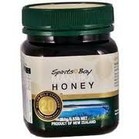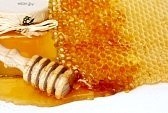Manuka Honey, real Ambrosia?
Is it a genuine natural miracle medicine?
Every now and again another ancient secret miracle cure is rediscovered and reintroduced under modern marketing and packaging.
We probably laugh at the old Victorian quacks and snake oil salesmen with their outrageous guarantees; but what is the difference between the miracle cure sellers of yesteryear and today's marketing people? The answer is how the product in question stands up to the claims.
Look at any natural organic product that has been growing for thousands of years, treating tribes and providing cures for everyday ailments, then someone happens upon it and immediately sees the money making potential.
Take honey, nothing new about it; the ancient Greeks called it “ambrosia”, Food (or drink) of Gods, Honey was used in mummification thanks to its antibacterial, antifungal, and antiviral properties and that is the beginning of honey as a medicine.
 Manuka Honey |
The healing power of Manuka honey
Manuka Honey is a perfect example of an ancient product that can be obtained from good health food suppliers.
Manuka is different to any other honey in that it has proven powerful antibacterial properties that, in most cases actually outperform many pharmaceuticals. That is a considerable claim and should be justified before we start banking the drum about Manuka Honey as an Alternative Medicine and miracle cure.
There is no such thing as a Manuka bee, the honey bee feeds from the pollen of the flowers from a Manuka bush also known as 'tea tree', which in turn is related to the Melaleuca tree (native to Australia) and a producer of Tea tree oil well known for its antibiotic and anti-fungal qualities for wounds that are failing to heal.
Manuka honey is one of those rare commodities that can be taken internally as we do with any other type of honey, but the major difference with Manuka honey is that it can be applied externally.
So we can apply it to infected wounds as well as skin conditions such as acne and eczema being mindful of its antibacterial, anti-fungal and antiviral properties.
Is it a miracle cure?
When consumed internally Manuka honey helps with stomach ulcers, ringworm, gastrointestinal disorders, stomach upset, acid reflux, sinus infections, IBS (irritable bowel syndrome), and taken for common cold and flu symptoms.
We are still learning more about Manuka honey as a medicine but we do know that expert medical research has proven that there is no bacteria known to man that has the ability to develop a resistance to Manuka honey. It is also capable of eradicating the MRSA virus.
 Manuka Honey |
Manuka honey, good and bad bacteria
Doctors are more likely to prescribe antibiotics than honey but it is known that antibiotics taken orally will actually kill all bacteria, this includes good and bad bacteria. Our body needs good bacteria, it is a friendly bacteria and the problem is that when antibiotics eliminate the good bacteria our system suffers an imbalance that could present negative side effects.
Despite extensive medical research into Manuka honey and its healing properties, there still is no real explanation as to why it does not effect the good bacteria, but obliterates the infectious bacteria.
Research into Manuka Honey
When researching Manuka honey I kept coming across the name, Dr Peter Molan MBE an Associate Professor in Biochemistry at the University of Waikato, New Zealand.
In 1961 he began studying Manuka honey, his research confirmed that it does genuinely have healing properties.
All honey has a natural hydrogen peroxide antibacterial agent, albeit in varying levels.
When bees gather nectar from pollen they naturally introduce an enzyme called glucose oxidase, a preserving component that presents itself when Manuka honey is in contact with human tissue, the enzyme slowly releases antiseptic hydrogen peroxide at sufficient levels to combat bacteria, thus embarking upon a natural healing process.
This discovery raised a “what if” question; “If the hydrogen peroxide is taken out, would Manuka honey retain high antibacterial qualities?”. Dr, Molan progressed with his experiments and added catalase to Manuka Honey samples, this is one of the most potent catalysts known to remove hydrogen peroxide. The same sample honey that had the hydrogen peroxide removed were once again tested for evidence of any remaining antibacterial activity. Results showed that some Manuka honey samples still had significant antibacterial activity.
The key factor is that only 'some' samples still had significant antibacterial activity. Such a varying range of hydrogen peroxide antibacterial activity in honey meant that a number of batches would have better healing qualities than others. This inconsistency in quality was not be acceptable.
In was crucial to standardise the classification of antibacterial honey activity so in 1996 an inspectorate called TradeNZ was formed in conjunction with the Honey Research Unit and an industry standard was established called the UMF® , this stands for Unique Manuka Factor.
A UMF® rating of 10 is the minimum activity to gain a rating, this is generally referred to as Active Manuka Honey.
When buying Manuka Honey look at the label for a UMF strength;
0-4: Not detectable ,
5-9: Maintenance levels only (not recommended for special therapeutic use),
10-15: Useful levels for therapeutic uses,
16-30:Superior levels with very high potency.
You might also like
How to React to and Help a Loved One with CancerDealing with cancer? Learn how to react, treat and care for a loved one when ...
Do You Have Your Own Cure For Cancer?Is it possible you might be completely unaware of the cancer cure, a natural ...




 The Real Meaning of Mary, Mary Quite Contraryon 06/10/2011
The Real Meaning of Mary, Mary Quite Contraryon 06/10/2011
 The Real Story of Little Jack Horneron 06/09/2011
The Real Story of Little Jack Horneron 06/09/2011
 Real meaning of Jack and Jillon 06/09/2011
Real meaning of Jack and Jillon 06/09/2011
 Real meaning of Baa Baa Black Sheepon 06/08/2011
Real meaning of Baa Baa Black Sheepon 06/08/2011


Comments
I used it for several months becaue of GERD and it worked!
guess what? local honey works the same!!! go figure!!!
and now I dont pay the ridulously high 'snake oil' price!!! :)
good article ghostwriter!!
Our daughter-in-law bought me some Manuka Honey and I enjoyed it in my tea for a long time, and then forgot it! Thank you for the reminder! I am off to fix a cup of tea with Manuka Honey!
I first thought it was a fad and used it as a 'last resort'; I'm learning to use it more and more for natural healing.
It is one one those things that you have to use it to believe it!
Well, my family vouches for the effectiveness of Manuka Honey. A very timely article - 10 minutes ago, I advised my son to take some for his sore throat. I will often take it at the early signs of a sore throat and I invariably find that the soreness disappears in 24 hours. I was introduced to Manuka Honey by a friend who has been using it for years with great effect.